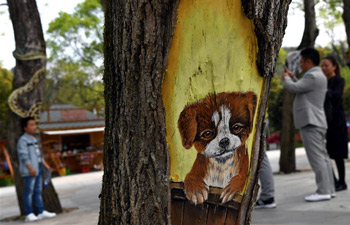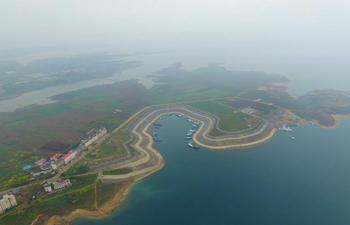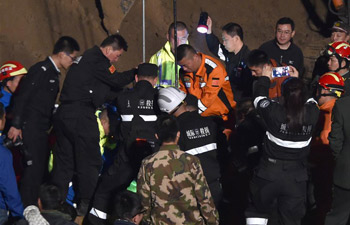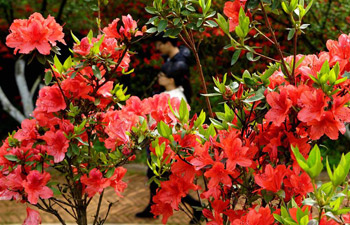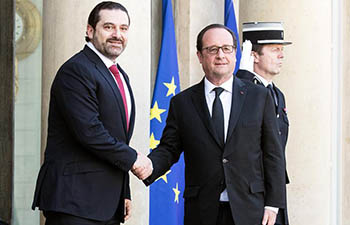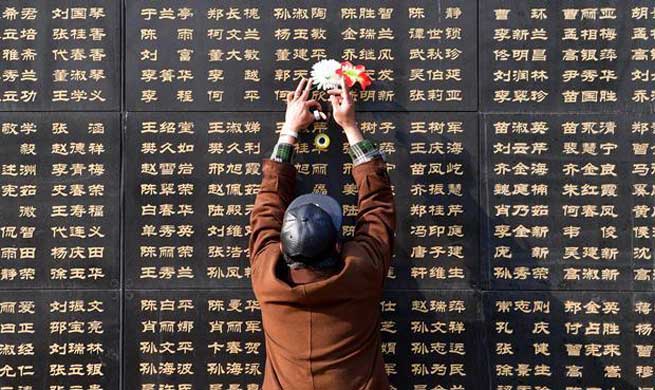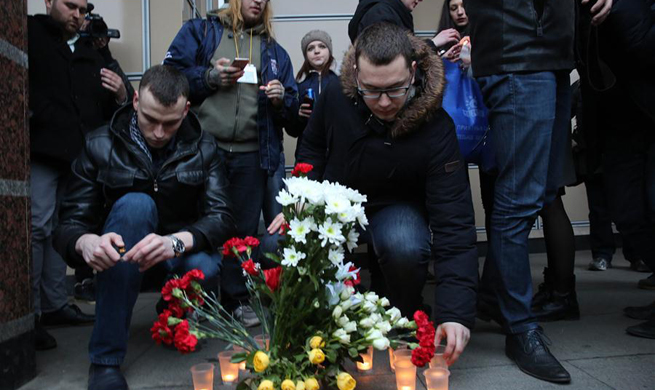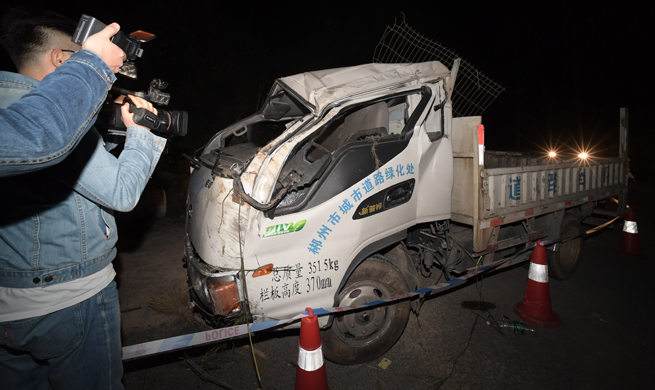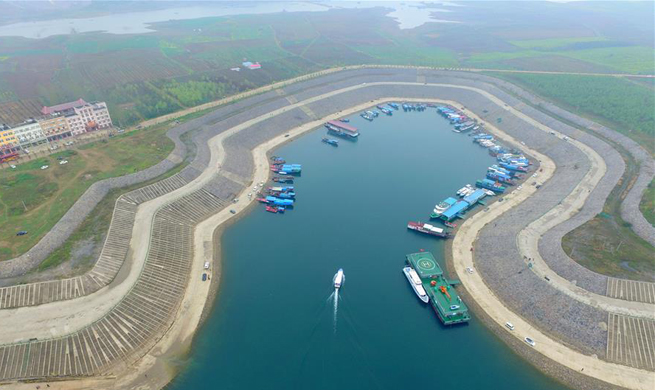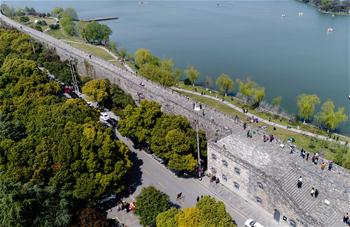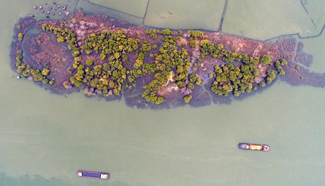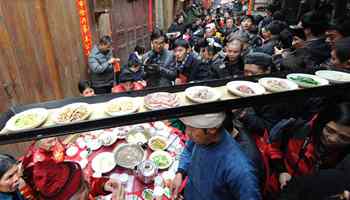TOKYO, April 4 (Xinhua) -- Japan's embattled education ministry may risk warping young minds for generations to come, if it continues to yield to the far right forces that hold sway in and around the administration of Prime Minister Shinzo Abe.
In doing so, it may wittingly push Japan towards a "precipice" from which it may not return.
The very foundation of the education ministry is at best shaky and perhaps more accurately is rapidly disintegrating.
Despite international condemnation, it continues to push the nationwide teaching of a whitewashed version of history; it has mandated the introduction of militaristic bayonet classes to its physical education programs, while currently embroiled in one of the biggest corruption scandals to have rocked the government in recent times.
The ministry's new issuance of curriculum guidelines along with factually inaccurate textbooks are an attempt not just to whitewash history, but, to essentially, brainwash the minds of children in their formative years.
The acts come amid Japan's ever-increasing propensity to revise or whitewash its acts of wartime barbarity, particularly regarding the Imperial Japanese Army's heinous treatment of its neighboring countrymen.
The ongoing attempts by Abe's administration to blatantly teach a distorted or highly-diluted version of historical events to children and bolster their sense of nationalistic pride have not been lost on experts informed on the matter.
Education specialists like Hidenori Fujita have stated unequivocally that historical and geographical education in Japan is rapidly going awry.
The Kyoei University professor previously said that textbooks here lack balance and fail to represent the feelings of unjustness from countries like China and South Korea, and are lacking in detail about the specific claims from non-Japanese parties regarding issues of territory and history.
In one such example, the Manchurian Incident was barely mentioned on one page in a textbook, and the Nanjing Massacre, "comfort women" issue and even the atomic bombings of Hiroshima and Nagasaki are barely footnotes in the textbooks.
The education ministry also states in its legally binding guidelines that China's Diaoyu Islands in the East China Sea and the Takeshima islands in the Sea of Japan, known in South Korea as Dokdo, are "inherent" parts of Japanese territory.
These statements alone threaten to severely warp children's understanding of historical facts and hence the minds of future generations here, including those that will go on to be leaders in politics, industry and, ironically, education in Japan.
The controversial guidelines will be fully implemented for elementary schools from fiscal 2020 and for junior high schools in fiscal 2021, with one of the most prominent revisions being that Japan's official position on the Diaoyu Islands is that there is "no dispute" over their sovereignty.
Ties between Japan and its closest neighbors have been particularly strained of late, regarding Japan's unrelenting efforts to whitewash its history, not just in terms of its diplomatic and political stance on issues of history and territory, but also owing to its ardent push to institutionalize its wrongful agenda.
Abe has, on a number of occasions, stated that Japanese young people do not have to keep apologizing in the future for Japan's atrocities committed before and during World War II, exposing his absolute reluctance to face up to history, and his dedication to delivering misguided and unsound messages to the younger generations here.
Some experts speaking with authority on the matter have accused Abe and his administration of flaunting his revisionist, militaristic and imperialistic stance and in doing so mocking his detractors.
They also maintain the textbooks and the education ministry in particular are also forcing nationalism onto children by way of requiring them to "get familiar with the national anthem and flag..." both of which have overt militaristic connotations.
And while at first the public here could have dismissed such moves as merely boosting national pride rather than instilling militaristic ideologies, the education ministry's recent approval of guidelines, which includes for the first time jukendo, or the "way of the bayonet" in physical education curricula, incontrovertibly confirms the direction the wayward ministry is heading in.
Critics have been quick to point out that as jukendo is in essence "a killing art," with practitioners thrusting blunted wooden bayonets at their opponents, targeting often vital parts of the human body such as the chest and throat, it is wholly inappropriate and immoral to institutionalize such a barbaric, war-derived discipline.
Experts have also pointed out that bayonets were a tool for the Imperial Japanese Army before and during World War II, and, as such, it is no great leap to see how the ministry's decision to reintroduce the technique as structured lessons in schools is one aimed at stoking nostalgia for Japan's past militarism.
"Bayonet fighting is not a well-recognized sport item like judo or sumo. It is not appropriate for our time now and is terrifying," said Ryuichi Yoneyama, governor of Niigata, central Japan, in a recent tweet.
He added that as jukendo needs special equipment and is not suitable for compulsory education, the adoption of jukendo, pushed by some lawmakers from Abe's ruling Liberal Democratic Party, could only "remind people of nostalgia for Japan's past militarism."
While the education ministry here is seemingly kowtowing to far-right wing forces and crowbarring a revisionist and militaristic agenda into its curricula with one hand, the other has been lining the pockets of a number of its senior officials by way of illegal "plum" job placements by ministry "insiders."
A probe was launched two months ago by the education ministry and Cabinet Office into the illegal job placement racket known locally here as "amakudari" (descent from heaven).
The practice involves current or former bureaucrats using their career-made connections through the ministry to find highly desirable jobs for retired or soon-to-be-retired bureaucrats.
Following the latest investigation, it was found that on top of 27 cases that initially shocked the nation involving ministry officials deliberately dodging laws to quash the illegal practice, 35 more ministry-linked officials have also been involved in "amakudari" offenses.
Altogether 62 cases, thus far, have been unearthed by the recent probe which covered all education ministry employees as well as retired officials.
The practice of "amakudari" was effectively banned in 2007 when legislation was changed regarding the re-employment of civil servants, largely due to the potential for corruption.
But those found guilty recently almost certainly side-stepped the law by using retired civil servants to deal with the illegal job placements, informed sources have said.
The education ministry itself has been forced to publicly acknowledge that its officials have been involved in making "systematic efforts" in arranging such lobbying for jobs.
The most recent round of "amakudari" scandals came to light in January this year when it was discovered that a former bureau chief who was in charge of overseeing colleges and universities "landed" a cushy professor post at a private university soon after retirement.
With the practice of "amakudari" seemingly ingrained into the cultural fabric of the education ministry, it was not a great leap for investigators to assume that the practice was likely occurring in other public sectors, with the foreign ministry here confirming that this was indeed the case.
A report based on the probe revealed that high-ranking officials knew the practice of "amakudari" was endemic in the education ministry and that ministry bigwigs had shockingly been involved in the scheme's creation and implementation for a long time.
History has taught Japan that the path to militarism leads to a "precipice" that this ostensibly pacifist nation does not want to be standing on. It is only through the correct education of the nation's youth by way of a morally virtuous education ministry that Japan will be able to take the step back it needs to face itself squarely.





